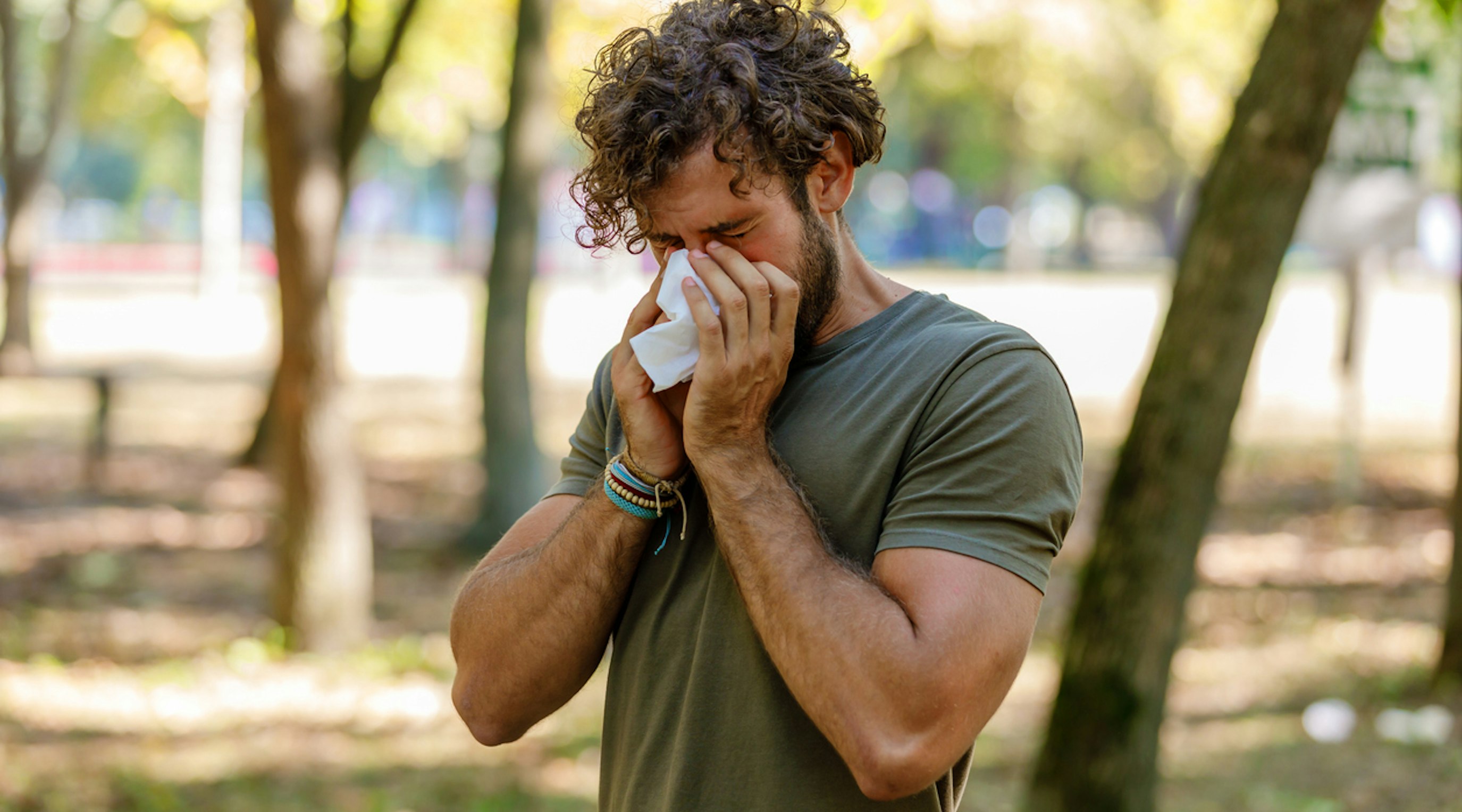Medical cannabis and hayfever - friend or foe?
9 min read
Sarah Sinclair
Longer days, lush green leaves—and a streaming nose; all sure-fire signs that spring is finally here in abundance. But is your medical cannabis prescription a help or a hindrance?
While the shift in seasons is welcome, the hay fever that comes hand-in-hand with the higher pollen count? Not so much.
Could the therapeutic properties found in cannabinoids help ease some of those irritable symptoms, or does flower actually exacerbate them? We take a look at the research.
Contents
Hay fever: the basics
What is hay fever?
Hay fever, also known by its medical name as allergic rhinitis, is an allergic reaction to pollen - especially when it comes into contact with your mouth, nose, eyes and throat. It is thought to affect around 20% of the UK population each year and can cause some pretty uncomfortable symptoms.
What causes hay fever?
Seasonal hay fever, which is caused by an allergy to pollen, is particularly common at this time of year, when the pollen count is at its highest.
Perennial hay fever is caused by an allergic reaction to allergens that are present all year round, such as mould, house dust mites and animals.
Hay fever symptoms
According to the NHS, common symptoms of hay fever include:
- sneezing and coughing
- a runny or blocked nose
- itchy, red or watery eyes
- itchy throat, mouth, nose and ears
- loss of smell
- pain around the sides of your head and your forehead
- headache
- feeling tired
Although the symptoms are very similar to those of the common cold, they can last for much longer, sometimes weeks or even months. Symptoms are usually at their worst between March and September, especially when it’s warm, humid and windy.
Hay fever treatment
There is no cure for hay fever, but there are some things you can do to help ease your symptoms on days where the pollen count is high.
Over-the-counter medications such as steroid nasal sprays and antihistamines can help alleviate some of the symptoms. Although these may come with their own side effects – the most common being drowsiness – meaning that some people prefer not to use them.
The NHS also suggests:
- Using vaseline around your nostrils to trap pollen
- Wear wraparound sunglasses, a mask or a wide-brimmed hat to stop pollen getting into your nose and eyes
- Shower and change your clothes after you have been outside to wash pollen off
- Keep windows and doors shut as much as possible
- Vacuum regularly and dust with a damp cloth
- Use a pollen filter in the air vents of your car, if you have one, and a HEPA filter in your vacuum cleaner
The NHS also recommends that you try not to spend too much time outside, walk on freshly cut grass, keep flowers in the house, dry clothes outside or smoke as this can make things worse.
Medical cannabis and hay fever
Can medical cannabis help hay fever?
Very little research has been conducted specifically on cannabis and its effect on hay fever. However, there are some indications that the therapeutic benefits of certain cannabinoids could help ease the irritating symptoms.
Cannabis is well-known for its anti-inflammatory properties, particularly those which have been demonstrated in CBD.
CBD’s interaction with the endocannabinoid system has also been shown to reduce some of the most common side effects that accompany a reaction, such as opening airways to make breathing easier, easing nasal pressure and reducing swelling and relieving congestion and mucus.
What does the research say?
A study from 2005 found that CBD may prevent cells from releasing histamines, while the immunosuppressive and anti-inflammatory components reduce the inflammatory reaction.
In 2013, researchers gave guinea pigs an antigen to stimulate a contraction in their throat muscles, which can be a common symptom of hay fever. They found that “cannabidiol reduced … airway obstruction”, adding that CBD “may have beneficial effects in the treatment of obstructive airway disorders”.
Scientists have also explored the effects of cannabinoids on allergies and sinus-related symptoms more generally, which shed some light on how they could help with hay fever.
In one study, a synthetic cannabinoid, designed to replicate THC was found to prevent peanut allergy, as well as reducing the effects of anaphylactic reactions.
And in a study of over 2,000 US adults, researchers found that those who consumed cannabis regularly were less likely to experience sinonasal symptoms than those who had never used cannabis.
Due to the cross-sectional nature of the study, the authors say they “cannot draw causal interpretations” between cannabis use and sinonasal symptoms. However, they go on to explain how cannabis may be helpful in mitigating several of the “pathophysiological elements” which contribute to nasal congestion – the most frequently reported symptom.
Can cannabis cause hay fever?
Of course, cannabis is also a plant and produces pollen which can trigger allergies. This could actually exacerbate symptoms of hay fever—especially when it is inhaled in flower form.
Smoking cannabis (which is not legal in the UK), or inhaling second-hand smoke from someone who is, could also cause respiratory symptoms including asthma and hay fever.
What is a cannabis allergy?
As cannabis becomes more widely available, reports of allergies to the plant itself are also increasing, although it is still thought to be rare.
Increased exposure to cannabis can also make you more likely to develop a sensitivity to it, which may be an issue for those working in the medical cannabis industry.
Cross-reaction food allergies
Cannabis can also cause what is known as a cross-reaction between certain food groups which share the same allergenic properties.
If you're allergic to one of these foods, you may be more likely to develop a reaction to cannabis:
- Almond
- Apples
- Bananas
- Chestnuts
- Eggplant
- Grapefruit
- Peaches
- Tomatoes
Cannabis allergy symptoms
When cannabis is inhaled, the symptoms of an allergy look very similar to that of hay fever and typically include:
- Nasal congestion
- Sore throat
- Shortness of breath
- Chest tightness
- Wheezing
- Dry coughing
- Itching and skin rash
- Swollen, watery eyes
Or you could experience a contact allergy from it coming into contact with the skin, with symptoms such as redness, rash, hives and dry and scaly skin.
Although it is extremely rare, you should call 999 immediately if you develop any symptoms of anaphylaxis after administering cannabis.
These might include:
- Sudden outbreak of rash or hives
- Severe shortness of breath with wheezing
- Racing or irregular heartbeats
- Shallow, rapid breathing
- Sudden severe diarrhoea
- Swelling of the face, neck, or throat
- Lightheadedness or fainting
- A feeling of impending doom
Does smoking make hay fever worse?
Yes, smoking is a major trigger for hay fever. It is illegal to smoke medical cannabis in the UK. Medical cannabis flower is prescribed to be taken through a vaporiser.
How can I boost my immune system against hay fever?
To help your immune system fight hay fever, eat plenty of fresh fruit, veggies, and foods rich in omega-3s like salmon or walnuts. Citrus and onions are great for boosting vitamin C and quercetin, which can ease allergy symptoms. Staying active, getting enough sleep, and adding probiotics through yoghurt or fermented foods to keep your gut healthy can also reduce the impact of hay fever.
Can I take CBD with antihistamines?
Yes, it is generally safe to take CBD with antihistamines. That said, some antihistamines do cause drowsiness, and CBD can also have slight sedative effects. It is always best to consult with your doctor before combining any medications or supplements.
What to do if you think you have a cannabis allergy — or it’s exacerbating your hay fever symptoms
If you think you could be experiencing any of the symptoms above, or you feel that your medical cannabis prescription is triggering or exacerbating your hay fever symptoms you should speak to your prescribing clinician.
There is no specific test to detect a cannabis allergy, but they may be able to diagnose you based on your symptoms.
They should also be able to provide some advice for how to manage it and discuss alternative administration methods that would better suit your needs.
Share article
Did you like this article?
It is important to seek medical advice before starting any new treatments. The patient advisors at Releaf are available to provide expert advice and support. Alternatively, click here to book a consultation with one of our specialist doctors.
Elevate your wellness with medical cannabis
Get comprehensive care, convenience, and confidence with an all-in-one treatment plan.
Am I eligible?Authors
Sarah, a distinguished journalist with over a decade in publishing and communications, now excels in cannabis health and policy journalism in the UK, advocating for informed health decisions through her award-winning work.
Editorial Policy
All of our articles are written by medical cannabis experts, guided by strict sourcing guidelines, and reference peer-reviewed studies and credible academic research. Our expert clinical team and compliance specialists provide valuable insights to ensure accuracy when required. Learn more in our editorial policy.
Need more help?










